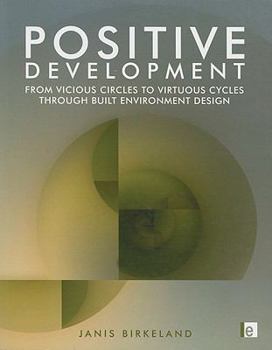Positive Development: From Vicious Circles to Virtuous Cycles through Built Environment Design
Janis Birkeland presents the innovative new paradigm of 'Positive Development' in which the built environment provides greater life quality, health, amenity and safety for all without sacrificing... This description may be from another edition of this product.
Format:Paperback
Language:English
ISBN:1844075796
ISBN13:9781844075799
Release Date:August 2008
Publisher:Routledge
Length:432 Pages
Weight:2.30 lbs.
Dimensions:1.3" x 7.4" x 9.4"
Related Subjects
Architecture Biological Sciences Business Business & Investing City Planning & Urban Development Ecology Economics Environmental Economics Environmental Policy Political Science Politics & Government Politics & Social Sciences Regional Planning Social Sciences Sustainability & Green Design Urban & Land Use Planning Urban Planning & DevelopmentCustomer Reviews
1 rating
Beyond 'sustainability'
Published by Thriftbooks.com User , 14 years ago
This is an ambitious book, at times strident in tone, written `to leapfrog the intellectual and institutional barriers that are entrenched in the foundations of urban and regional planning'. The central notion is `Positive Development' defined as a `physical development that achieves net positive impacts during its life cycle over pre-development conditions by increasing economic, social and ecological capital.' As such it embodies a strong critique on the notion of sustainability that has held sway since the Brundtland report in 1987. `Sustainability' as it was originally defined comes down to seeking an appropriate trade-off between economic growth and the associated environmental cost. Technology plays a key role in decoupling growth from impacts as much as possible. Birkeland assumes a more radical stance that opposes equating sustainability with `industrial growth with less impacts' and the underlying substitutability of economic, social and environmental goals. She refuses to see negative impacts as inevitable and argues that a productive infrastructure needs to be built that enhances our natural resource base, not merely minimizes our impact on it. The central task for Positive Development, therefore is to come up with a design and planning approach that is able to increase natural capital: a `surplus' of renewable resources provided by natural systems. However, thinking in terms of trade-offs is so deeply ingrained in the planning practice that it needs to be reconceptualized from the ground up. Building rating schemes and sustainability assessments are based on analytic frameworks that are reductionist, aggregative and sequential: "They prioritize bean counting over design, accounting over accountability, and prediction over performance." As an alternative, Birkeland proposes a comprehensive, flexible and systemic methodology (SmartMode: Systems Mapping And Re-design Thinking Mode) built around a number of `forensic audits'. These audits are intended to create transparancy around the resource transfers (metabolic flows) and power differentials amongst stakeholders. Other tools, such as Lifecycle Analysis or Environmental Impact Analysis, all of which have considerable weaknesses, can function as potential subsets of the approach as they are subsidiary to design for democracy and ecology. They should definitely not determine the logic underpinning the complete design. One of the most interesting features of Birkeland's approach is the distinctive role it allots to the activity of design. It is a powerful, positive intervention strategy in its own right, a fundamental alternative to both regulation and incentives: "The latter two suggest we do not know what to do, only what people should not do." Design is an antidote to the (often unintentional) complacency and `managerialism' that now dominates urban planning. Here Birkeland connects to the broader debate on `design thinking' which embodies a positive, non-survivalist, pragmatically ut





